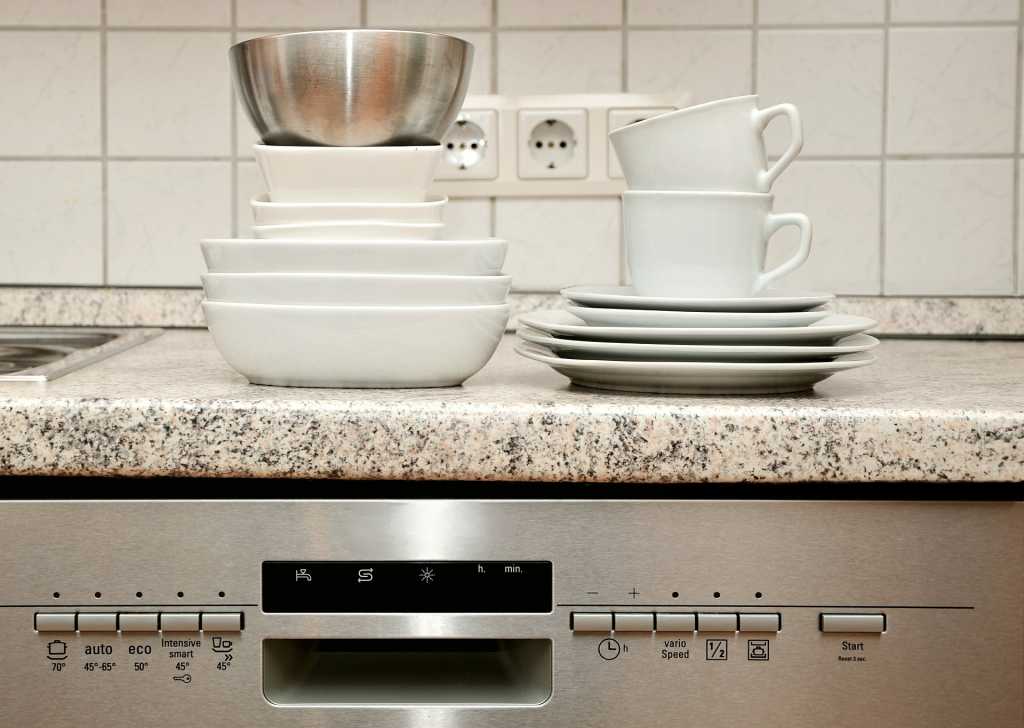When we opt to go for a dishwasher in our home, we focus on the chores that need to be done. Some of us are wondering, though, how they perform in terms of energy, water consumption and how they affect the environment.
Indeed, sometimes it feels counterintuitive: the dishwashing cycle, on average, runs up to 2 hours and more. Sometimes, if you are using dishwasher during the day, you might even avoid putting there the pan that you might need to use soon.
This extended time for the washing (compared to the much older washing machines) is actually what saving you a lot more energy and water. A modern Energy Star rated dishwasher uses 4 gallons per full cycle. Just to compare with hand washing: a faucet runs 2 gallons per minute.How many dishes, really can you wash efficiently within that time?

If you are concerned about the added energy consumption during the wash cycle you should not worry about that as well! The energy star dishwashers use about half the energy that is used to heat up the water to wash the same amount of dishes by hand. And the perk is – they even are able to steam your dishes – that works so well for those baked on leftovers that are so hard to scrub off manually.
Another great perk of using a dishwasher, even during the normal wash cycle the fats and greases break down pretty well, the food leftovers pulverized easily go down the drain. It helps prevent the grease buildup in your drain (as those who had a drain back up at home would know).
Want to go even more environmentally conscious?
As we see, modern dishwashers are doing pretty good when it comes to the environment. But you can always go a step further.
- Use the light wash cycle instead of regular (if you do not see much difference)
- Have a half-full dishwasher? Use rinse and hold and add more dishes later
- Use delay start cycle to do the washing during off-peak energy consumption
- Skip the pre-rinse cycle
- Turn down your water tank thermostat to 120
- Air dry the dishes
- Do not install the dishwasher next to your fridge – It will make your fridge use more energy
Do you need to pre-rinse dishes before putting them in a dishwasher?
It really depends on the year your dishwasher was made. For decades it was the rule. Now the new generation of dishwashers is equipped with the dirt sensors that pick up the indicators of dirt and chose the adequate washing cycle.

While this feature is said to waste more water and energy, if you compare it to manual rinse, it doesn’t even come close.
In fact, if you rinse dishes manually before putting them in the dishwasher with dirt sensor, it will fail to pick up the dirt, and as a result, you might end up with some dirt residue on your dishes after the wash.
Phosphate free dishwashing detergents
Back in 2011 regulations on restrictions of phosphates in the dishwashing detergents came out. Phosphates in the cleaning products were responsible for algae growth in the waterways. Unfortunately, at the time phosphates did deliver the best result for streakless washing.
When the changes were made, the general public was not quite aware. Clients started noticing residue and streaks, especially on the glassware coming from the dishwashers. They thought the problem was with the dishwasher. We remember getting a lot of those service calls then.

Now the main brands Cascade and Finish adjusted pretty well to these requirements, and there is a great range of other options on the market as well.
Other alternatives that work well to remove the film from glassware – running a cycle with citric acid or vinegar.
We are glad to see another environmental challenge got resolved well.
New generation of dishwashers – more eco-friendly features
The lower energy consumption is a given in the newer models, but it goes further than that:
- Built-in Soil sensors check the level of grease and adjust the washing cycle accordingly
- Better water filtration quickly removes soils from the system allowing for a more thorough wash
- High jet efficiency use less energy and more pressure for optimized cleaning
- Optimized rack design ensure strategic dishes placement, also allow to fit more in the same size dishwasher
- Quick wash cycle – on some of the models as fast as 30 min
- Some Bosch models use zeolite minerals for drying to reduce power consumption
- Auto Open door at the end of the cycle to let the steam out (especially helpful during the delayed wash cycle

Overall we see a lot of improvement in the dishwasher design over the years that are really geared toward saving energy, allowing more user-friendly options. Dishwashers are well equipped to take care of thorough cleaning the dishes and help protect the environment at the same time.
Related Article: HOW MUCH DOES DISHWASHER REPAIR COST IN TORONTO?

